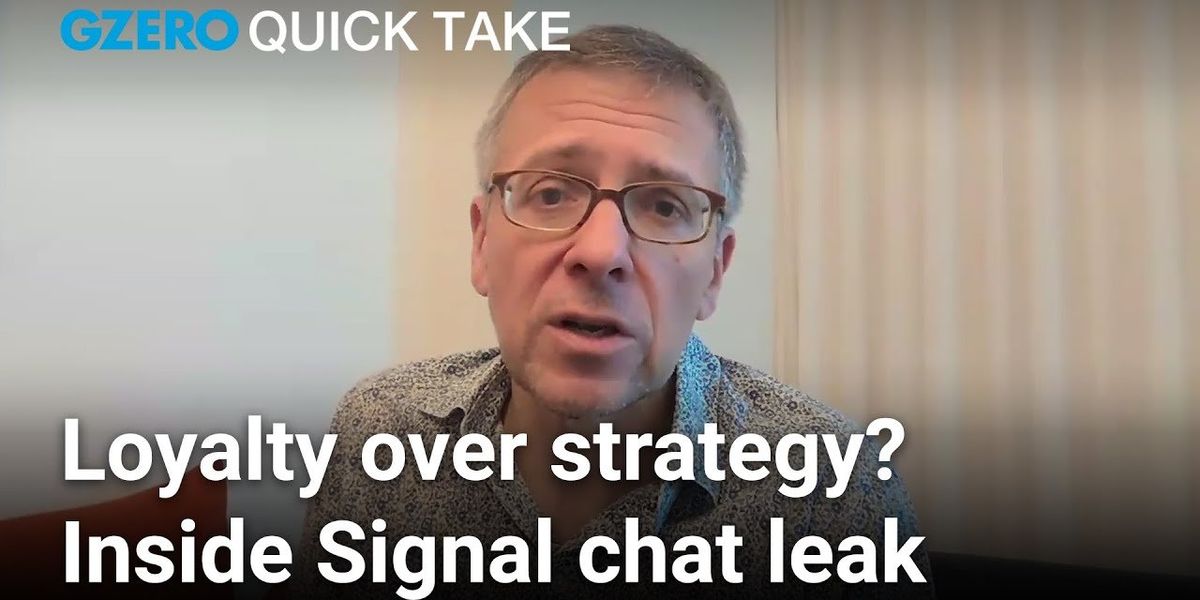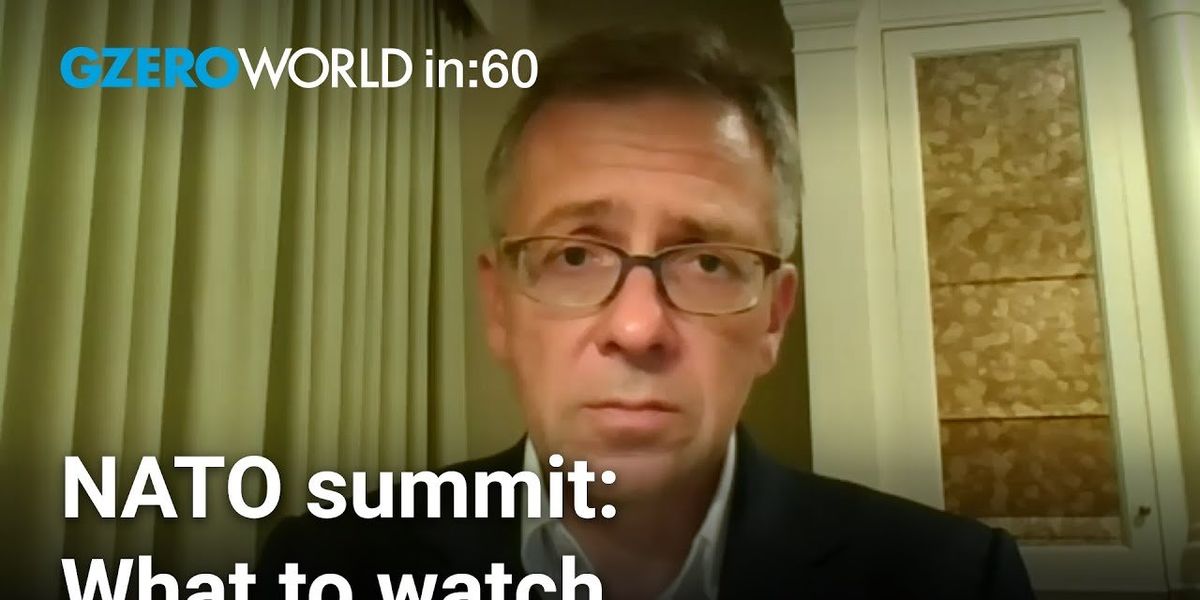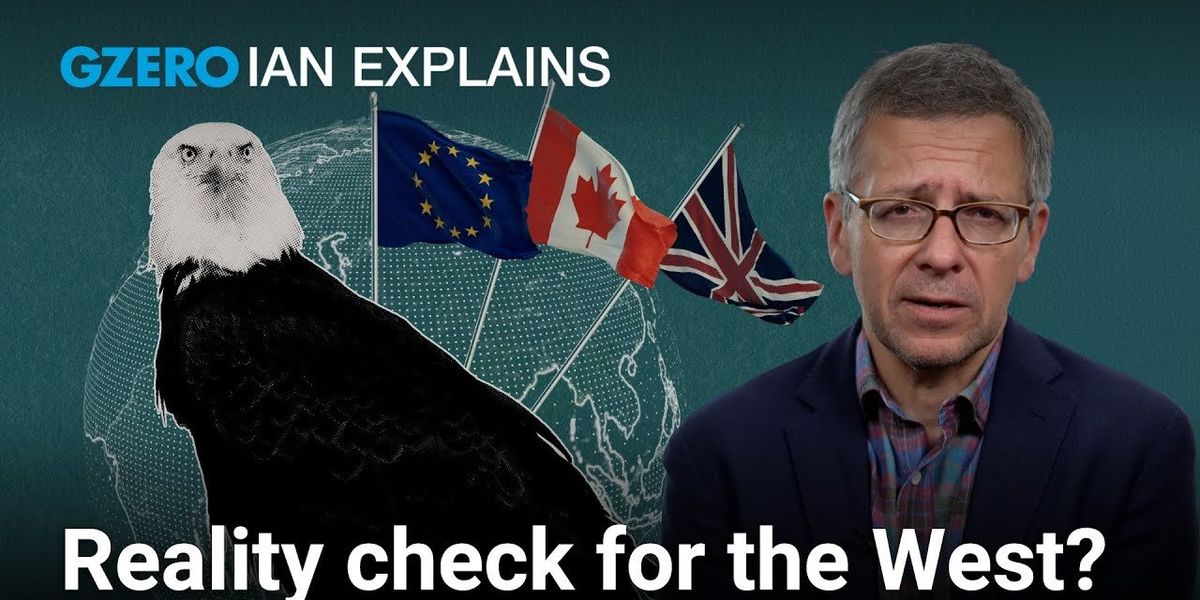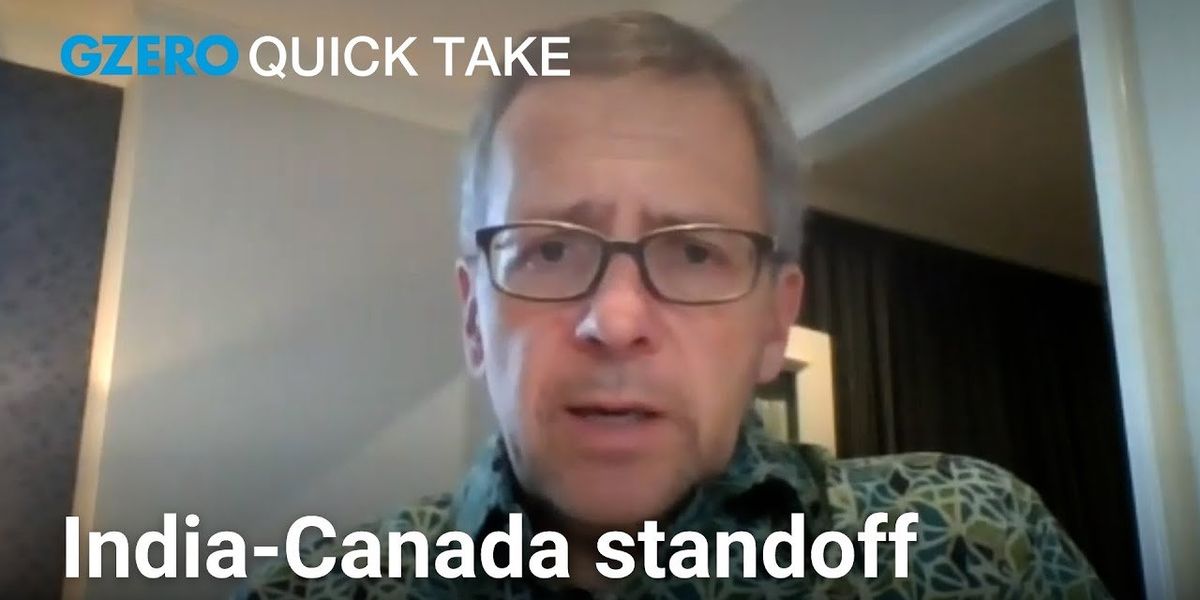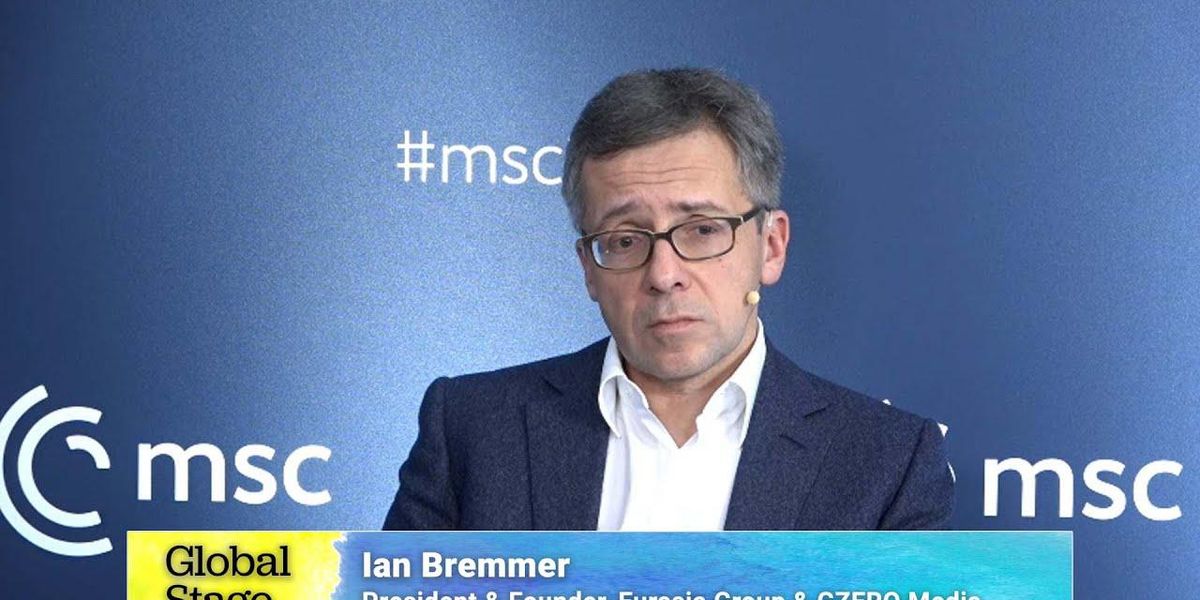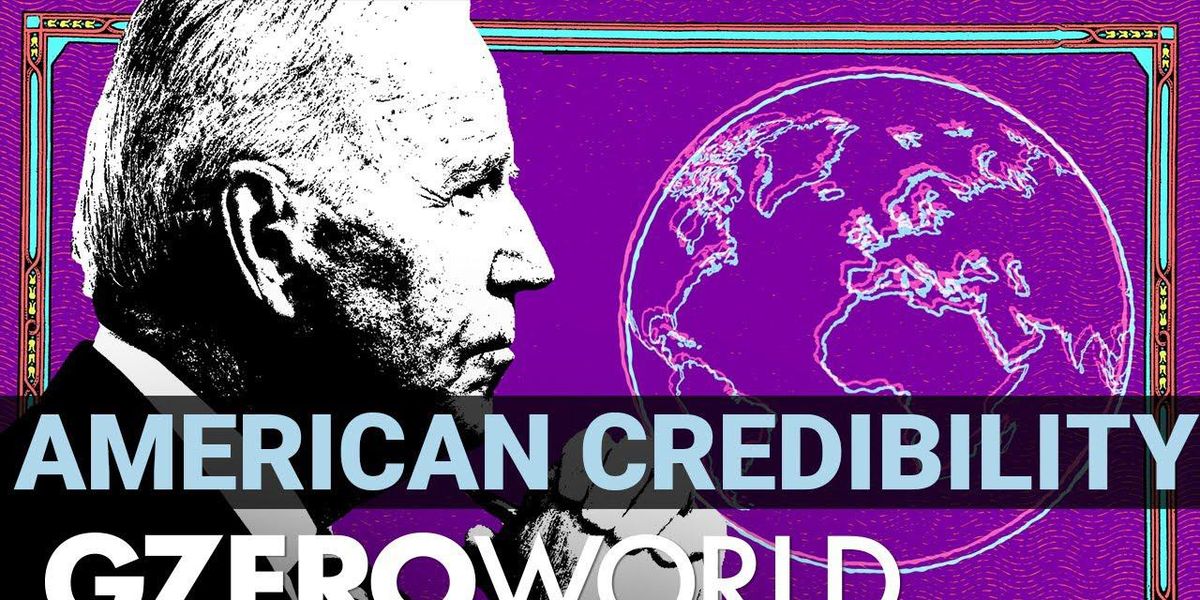Trending Now
We have updated our Privacy Policy and Terms of Use for Eurasia Group and its affiliates, including GZERO Media, to clarify the types of data we collect, how we collect it, how we use data and with whom we share data. By using our website you consent to our Terms and Conditions and Privacy Policy, including the transfer of your personal data to the United States from your country of residence, and our use of cookies described in our Cookie Policy.
{{ subpage.title }}
Leaked Signal chat shows Trump team's mindset
Ian Bremmer's Quick Take: A Quick Take on the back of the full transcript of these Signal chat that's going on about the bombing of the Houthis. A few things here. First of all, are we surprised that a journalist is actually publishing what is clearly classified data? And there's no question, it's classified data. I mean, you're talking about the targets, the exact timing in advance of US military strikes, incredibly sensitive information, against people that are described as terrorists in the chat. And clearly, if that information had gotten out in advance when Jeffrey Goldberg had received it in real time, it would have put the operation at risk. It would have prevented it from going on. It would have been denounced as leaking classified information, and he would be facing some legal charges from the administration. So I don't think it's credible to say that this is not classified.
But since Trump and members of administration have now said that it isn't classified, there was nothing classified in it, I guess that provides legal cover since it is ultimately in the charge of the president to be able to determine, as president, whether or not something is classified. That there's nothing illegal in Goldberg and the Atlantic Magazine now taking all of that information and putting it out to the public. So is that embarrassing for the US with its allies in terms of how they're handling such a chat? The answer is of course, yes. And I expect that we're going to see a significant amount of continued focus on this topic. A lot of people are going to be asking questions about how it was that this conversation could have been had on Signal and also how it was that Goldberg could have been brought on board. But say that as it may. I mean if you are the Trump administration here, it is age-old tactic, full denial responsibility is actually of your political adversaries so blame Goldberg. Imply that maybe he tried to get on the call through nefarious ways.
It's all his fault. It's overstated. He's a fake news, no news journalist. No one should pay attention to him. He's a bad guy. I mean all of that stuff. And I was particularly bemused by Elon Musk sharing a post from the Babylon Bee saying that, "If you wanted to ensure that nobody ever saw information you'd put it on page 2 of the Atlantic." And of course, that is true for Elon, and it's true for Trump supporters. And this is why the strategy works, is because the Atlantic and the people that read the Atlantic and support the Atlantic are all considered disinformation by those that are loyal to Trump. And vice versa. Fox, and Newsmax and all of the right-wing podcasts. Those are considered fake news by people that don't support, that dislike Trump. And that allows a strategy of full denial, not engaging with the facts and blaming those that are coming after you to be successful. Now, I still think that there are interesting pieces of information here.
Perhaps the most important is that the actual policy conversation, not the details of the war fighting itself, but rather whether or not it was a good idea to be attacking the Houthis, in a big way that was potentially going to increase energy prices. And that was much less of a fight of the Americans than it would be of those in the region that are engaged in the direct proxy war with Iran or the Europeans who have a lot more directly at stake, in terms of their trade in transit. And that was a very reasonable question, and it was strongly, in other words, Vice President Vance opposed these strikes and he's the most important person. He's the most senior ranking person in this chat. Trump isn't on the chat. And he's not saying the president is wrong. He's saying, "I don't believe the president is fully informed and this clearly is not in his interest, in his policy interest."
Now, the reason this is important is because in Trump's first term, I think you would have had a very similar conversation from people like Mike Pence and Mike Pompeo and others that would have been on this chat, but then they would have brought it to the president. And many, many instances in the first term of policy disagreements that then came up and said, "Mr. President. Respectfully, we think we've got additional information and we can better carry out your will by doing X, Y, and Z." And there were checks. There were internal checks on executive authority. What we see this time around is we see JD Vance, who's obviously a very smart guy saying, "I think this is a really bad idea. We shouldn't be doing it, but I'm prepared not to raise it to the president unless I have everybody around me supporting me because I can't do this by myself. I'm just going to get my head chopped off." And there's a little bit of back and forth.
And Stephen Miller, the deputy chief of staff for policy in the White House and a full-on Trump loyalist, says, "Nope, the president wants this. I'm ending the conversation." And that's the end of the conversation, and it never gets to Trump. And then they go ahead and they bomb. So whatever you think about whether this was a good or a bad decision, the challenge here is that we have a big cabinet, some of whom are very capable, some of whom are absolutely not capable. But first and foremost is not getting the best information to the president because he's extremely confident. He believes that his policies are always the right ones, and he is absolutely punishing anything that feels like disloyalty, inside or outside of his team. That's why Pompeo, for example, John Bolton, have had their security details stripped away. Even though the Iranian government has been trying to assassinate them, right? Why? Because they were disloyal to Trump. That's not why they're trying to assassinate him. That's why Trump took away their security detail and that is a very strong message to everybody that is on this chat.
And I do worry, I worry that the three most powerful men in power today around the world, all in their 70s, Trump, Putin, and Xi Jinping, are also men that are incredibly confident about the rightness of their views. That loyalty is the key to the most important currency of power that exists inside those systems. And increasingly, they're not getting good information from their own advisers. That's a dangerous place for the world to be. It's a dangerous place for the world to be heading, and that's frankly the most important thing that I took out of this chat. So that's it for me. I'll talk to you all real soon, thanks.
NATO Summit: Biden's uncertain future worries US allies
Ian Bremmer shares his insights on global politics this week on World In :60.
What are you watching for at the NATO summit?
Well, first and foremost, it's how all of these allies are responding to a very real political crisis in the United States. US, of course, the country they rely on for leading NATO, by far the biggest military power in the world, their principal ally. And they now know that the likelihood that Biden is going to be able to win, is a lot lower than it was the last time they saw him. And they've been seeing him. They saw him at the G7. They saw him in Normandy. They saw him, you know, at the United Nations and some in bunch of bilats and and everyone I've spoken to, says that they're not all confident that he can win. They certainly don't think he can serve out four more years. And they're deeply worried, especially because what a Trump administration might mean for them, with the exception of Viktor Orbán, almost all the NATO allies are very worried. They know that NATO, the EU, the war in Ukraine, all of that much more uncertain if Trump were to come back as president. So that's what I'm watching for and see how that plays out.
How will the UK's new PM, Keir Starmer, lead Britain?
Economically, not all that different. He's focused unusually for labor, focused on a pro-growth policy. He's promised that he isn't going to raise the major taxes like income tax and VAT. And so, he will probably find some more money in things like inheritance tax, he’s going to try to get more private sector investment into the economy. Certainly, wants to have a consistent policy on Ukraine, consistent policy on the United States as the previous conservative governments. Big change will be tried to reestablish stronger relations with the European Union and particularly Ursula von der Leyen, expected to get the nod for another five years running the EU. Keir Starmer spent a lot of personal time working on that over the past months.
As a Russian missile struck a children's hospital in Kyiv is there still no end in sight for the war in Ukraine?
No, no, there's no end in sight. in fact, while that was happening, Narendra Modi, the Indian PM was being quite friendly in Moscow on his visit with Putin. This is a partner of the United States. Putin feels like right now, especially if Trump is elected that his bet on this invasion in Ukraine will work out well for him. And that is not what NATO allies want Putin to be thinking right now. There's been success in getting them a lot of support, the Ukrainians, over the course of the last six months, and certainly they're going to have more money over the next year. But longer term, there's a huge question about how that plays out. And Putin is showing impunity right at the beginning of the NATO summit by sending all those missiles at civilian targets, including sick kids in Ukraine. Not a surprise. but still pretty sickening.
- UK's new PM Starmer aims for closer EU ties ›
- Who is Keir Starmer? ›
- Ukraine will define the future of NATO ›
- How Erdogan won the NATO Summit ›
- Senator Mark Kelly on President Biden's future in the 2024 race and fitness for office - GZERO Media ›
- Ian Explains: Why Biden is the focus of the NATO Summit - GZERO Media ›
- At NATO Summit, Polish FM Radek Sikorski weighs in on Ukraine war - GZERO Media ›
- Ukraine can still win this war, says Poland's FM - GZERO Media ›
Ian Explains: How political chaos in the UK, France, & Canada impacts the US
Big political changes are coming in Western democracies, is the US ready to deal with the fallout? Voters in the United Kingdom and France will head to the polls in the coming weeks after UK Prime Minister Rishi Sunak and French President Emmanuel Macron called snap national elections. Both political gambles could have a huge impact on everything from the West’s collective ability to deal with climate change to the AI revolution and countering China’s growing influence.
On Ian Explains, Ian Bremmer breaks down the tumultuous landscapes of French and British politics right now, with an eye on upcoming elections in Canada and the United States.
In Britain, Rishi Sunak’s Conservative Party is almost guaranteed to lose control of the government. In France, the far-right National Rally Party is highly favored to win the most seats in the National Assembly. A similar story is playing out in Canada, setting the stage for a potentially brutal electoral defeat next year.
So why should Americans care about all this political chaos so far from home? Watch Ian Explains for more on what’s at stake with so many big elections on the horizon.
Catch GZERO World with Ian Bremmer every week at gzeromedia.com/gzeroworld or on US public television. Check local listings.
- G7 meeting: Ukraine and Meloni take center stage ›
- Macron-Meloni spat spotlights Europe’s left-right divide ›
- Ian Explains: Will foreign policy decide the 2024 US election? ›
- UK Prime Minister Sunak's push for early election will hardly boost his chances ›
- Macron's snap election gamble will have repercussions for France and EU ›
FILE PHOTO: Philippine Navy welcomes the arrival of Japanese Maritime Self-Defence Force ship for a two-day goodwill visit upon its arrival at the South Harbor in Metro Manila, Philippines April 26, 2018.
Japan looks south to bolster its security
Japanese Prime Minister Fumio Kishida is in Manila Friday for a summit with Philippines President Ferdinand Marcos Jr. as Tokyo attempts to draw closer to partners in Southeast Asia to hedge against China.
Tokyo already has extensive economic and diplomatic ties to the Philippines, and has strategically cultivated strong relations in Southeast Asia since the late 1970s. However, during this visit, along with a stop in Malaysia this weekend, Kishida hopes to deepen military ties, opening up Japanese defense exports to both countries, and setting up cross-training programs.
Adding a military dimension is an important change for Tokyo. In the wake of World War II, instead of a collective security strategy à la NATO, the United States pursued a “hub and spoke” system in Asia. Countries like Japan, South Korea, and the Philippines were all allies of the US, but not of one another, in part to maximize US leverage but also because each country faced diverging threats. What concerned Manila in the 1950s wasn’t necessarily an issue for Tokyo.
Now there’s one problem everyone in the region cares about: the Chinese military. Tokyo is well aware it can no longer rely on technological superiority to protect itself from China — nor can Washington. What it can do is fall back on those longstanding ties and give a boost to partners in Southeast Asia, says Eurasia Group’s Japan Director David Boling.
“Kishida’s visit to the Philippines to strengthen defense cooperation is Japan’s way of reminding China of this: You may be bigger than we are, but we have more friends than you do,” he said.
India-Canada standoff heats up while US seeks a compromise
Hi, everybody. Ian Bremmer here. And a Quick Take to kick off your week.
India and Canada. Not the two countries that you expected to be getting into a big public fight. But that is exactly where we are. And the Americans are uncomfortable. And sort of in the middle of it, though I'm about clearly on Canada's side. Give you a little background.
So largest Sikh population in the world outside of India is in Canada. They are politically active and relevant. They're concentrated in a few key voting areas. And while they tend to vote conservative, all three parties interested in being aligned with them. Most of them, of course, perfectly fine from a political perspective. But there also is a small group of radicals who support secession of their homeland from India. Radical organizations, some of which have been supportive of and engaged in terrorist activity in India. The Indian government has been public and very critical that the Canadians are allowing big Sikh demonstrations. Canadians say, “Hey, we have, you know, sort of freedom of speech. What do you want us to do, close down these demonstrations?” Indians, “Yes, we would actually appreciate that.” And also that they've been harboring radicals and terrorists and they need to take action against them. Then the Canadian government found out that one of the leaders of a radical Sikh institution, who is a Canadian citizen who was assassinated in Canada, found out from the Americans that the Indian government was behind the assassination. And indeed, there were recordings of Indian agents talking about this apparently before and after.
And that was shared with all the five eyes. So the UK and Australia and New Zealand, I'm not privy to this intelligence. I don't have those clearances. But leaders that I've spoken to in those countries tell me that this evidence is rock solid. So look, Trudeau very concerned about this. I mean, imagine if Khashoggi was an American citizen and gunned down in New York, right? I mean, this is clearly a big deal domestically for Trudeau wants to find a way to find an off-ramp. So back in August, he sent his national security and intelligence advisor to Delhi. She's the equivalent of Jake Sullivan in the United States. The meetings go absolutely nowhere. Indian government takes no responsibility, refuses to talk about it. Then when Trudeau himself goes to Delhi for the G-20, I had heard that the meeting between Trudeau and Modi was shockingly bad. I heard that read out from a number of people. I was very surprised because the topics they were discussing weren't so chippy. And that's because Trudeau was actually bringing this up. And Modi said, “Absolutely not. We have nothing to do with it and how dare you bring this up? And you're, by the way, harboring all these extremists and we're really angry at you.”
At that point, Trudeau decides to go public because this information is going to end up public in the criminal case around the murder and, you know, now you've got a problem. So the Indian government is, you know, taking no prisoners on this issue. They're condemning the Canadians. They have, you know, gotten rid of a Canadian envoy. They've suspended visas from Canada to India. And clearly, the trade relationship, which isn't huge, it's actually pretty small, but nonetheless would be at risk. And so too, Canada's Indo-Pacific strategy, which they announced a great fanfare a year ago, spent a lot of time writing it up. It's pretty thoughtful because their China relationship is easily as bad as America's China relationship. Frankly, it's worse and the Canadians don't have as much leverage and well you can scratch the Indo from the Pacific strategy right now. Meanwhile, Modi is enormously popular for telling off the Canadians.
First of all, it is not making all that much news. It's mostly below the fold in Indian newspapers in Canada, of course, has been leading all the coverage. In India itself, yes, big Sikh population. But those Sikhs are primarily affiliated with a political party that is in alliance with Modi's own BJP. And they strongly oppose these secessionist movements and the radicals and the terrorists that have been involved in it. In fact, you know, informally you hear people when they find out that the Indians might have actually done this such an assassination, they're kind of proud. They're like, wow, we're like Israel. Who knew that, you know, we defend our national security so well? And the Congress party, which is the main opposition party to Modi strongly supporting Modi on this issue. So it's a serious impasse. It is one that is not going to get resolved any time soon.
The Americans are trying to work a compromise because what the Canadian government wants is, you know, not for Modi to say, “I'm personally responsible and I'm really sorry,” wants to do an investigation, find out who was responsible for it,have a head or two roll, even if they're junior and then put this behind them. Modi has absolutely zero interest in doing that, especially with the Canadians. And it's unclear how public the Americans are going to get on this issue precisely because the India relationship has been a big win for the United States. And indeed, Biden was planning on going to India for their national day coming up in a couple of months as the principal guest. This could put a spanner in that. So watch it all very carefully. But that's where we are in India-Canada. A lot to pay attention to and not easy to resolve.
Hope everyone’s doing well. I'll talk to you all real soon.
- Hard Numbers: Iran cracks down on women, bestsellers sue AI, Venezuelan migrants get right to work, India suspends Canadian visas, Turkey jacks up rates ›
- Does Canada have a foreign policy? ›
- Trudeau’s assassination allegations put Canada’s allies in a bind ›
- Canada accuses India of assassination ›
- India and Canada expel diplomats, US treads carefully ›
- Canada-India relations strained by murder allegation ›
- What the G20 summit revealed about the Modi Trudeau relationship ›
- Ian Explains: Biden-Trudeau summit well worth the wait ›
- Trudeau lays out plan to grow Canada’s clean economy ›
- Ian Explains: Why India-Canada relations are tense over a mysterious murder - GZERO Media ›
- Podcast: Death and diplomacy: A look at India-Canada tensions with Samir Saran - GZERO Media ›
- US-Canada ties: Mark Carney outlines how America can benefit from its neighbor - GZERO Media ›
- How political unrest across the West will impact the world: A conversation with UN's Mark Carney - GZERO Media ›
The Pentagon is seen from the air in Washington, U.S., March 3, 2022, more than a week after Russia invaded Ukraine.
What We’re Watching: Suspected US intel leaks, peace talks for Yemen, Lula talks trade with Xi
A murky document mystery
Some months ago, mysterious documents began showing up on websites used mainly by online gamers that appear to reveal top-secret US government information on the war in Ukraine and other sensitive topics. In particular, they include what seem to be maps of Ukrainian air defenses and an analysis of a secret plan by US ally South Korea to covertly deliver 330,000 rounds of ammunition to Ukraine to boost its widely expected spring counteroffensive.
Once noticed, copies of the documents made their way into mainstream media and triggered investigations by the Pentagon and the US Justice Department over possible leaks. Ukrainian officials say the documents may have come from Russian spies. Others say someone inside the US intel community must have leaked them. Some experts warn the documents may be fakes.
Given the stakes for Ukraine and for US relations with allies, this isn’t a story anyone should ignore. But the most important questions – Who did this? Why? Are the documents real? Will they change the war? If so, how? – can’t yet be answered. And like the mystery surrounding the explosion that damaged the Nord Stream pipeline last September, they may never be answered. We’ll keep watching.
Will peace finally come to Yemen?
A Saudi delegation is visiting Sanaa, Yemen’s capital, for talks with Iran-backed Houthi rebels in hopes of ending the nine-year conflict that’s turned Yemen into one of the world’s worst humanitarian crises.
The war began in 2014 when Houthis, who are Shiite, overthrew the Saudi-backed Sunni government and took over the capital. Violence has since plagued the country, and the conflict has broadly been seen as a proxy war between Iran and Saudi Arabia. Fighting has also spilled over into Saudi territory, where rebels have targeted the kingdom’s oil infrastructure.
The talks – mediated by Oman – come after both sides agreed last month to renew a previously expired ceasefire. Still, several thorny issues remain, including how to secure oil fields in rebel-held areas, as well as the easing of blockades on Sanaa’s airport (by the Saudis) and Red Sea ports (by Houthis) that are obstructing the flow of humanitarian aid to 21.6 million people.
Hopes of a resolution in Yemen come after Tehran and Riyadh recently agreed to renew diplomatic ties after a seven-year rupture. Expectations of a cessation of hostilities, however, have been raised and dashed in the past.
Lula to talk trade in China
Brazilian President Luiz Inacio “Lula” da Silva is heading to China on Tuesday for a four-day summit. The trip was originally planned for March but was postponed after Lula contracted pneumonia.
Lula lands in Shanghai before heading to Beijing, where he’ll meet with Chinese President Xi Jinping. The Brazilian leader is being accompanied by more than 250 business leaders, nearly a third of whom belong to Brazil’s agricultural sector. His entourage tells us that these meetings will be about trade, trade, and more trade. Lula will also invite President Xi to Brazil to view projects for which Brazil is seeking Chinese investment.
After Lula’s last visit to Beijing in 2009, China became Brazil’s top trading partner, causing demand for its soybeans, iron ore, and oil to skyrocket and fueling an economic boom for Brazil. By 2021, Brazil was China’s largest destination for foreign direct investment. Now in his third term, Lula is facing a tough economic and political landscape and hopes to revive his stagnating economy by diversifying Brazil’s trade relationship with China.
The two men will also discuss the war in Ukraine, with Lula believing he can help negotiate peace.
But Brazil is already navigating tensions between the US and China. In February, Lula met with US President Joe Biden to affirm his relationship with Brazil’s most important regional security partner. Meanwhile, China is hoping that by strengthening its relationship with Brazil it can boost its influence in Latin America and weaken Brazil’s ties to the US. The meetings come just days after China and Brazil agreed to ditch the US dollar and exchange their currencies directly. So in China, Lula must tread carefully to stay in both Biden's and Xi’s good graces.
US & NATO will draw a hard line on Russian aggression in Ukraine – Ian Bremmer
In recent years, the US has often shown an “unwillingness” to do much in response to states and non-state actors taking swings at values-based norms, GZERO President Ian Bremmer said recently at the Munich Security Conference. We saw that when the US failed to enforce its "red line" in Syria in 2013, when Russia annexed Crimea in 2014, as well as when the military junta stole power in Myanmar a year ago, Bremmer says. So will Ukraine be any different? Bremmer thinks it will: it seems there’s been “a decision by the United States and all of its allies that this line is too far. Enough!”
Bremmer spoke with moderator David Sanger in GZERO Media's Global Stage livestream discussion at the Munich Security Conference.
Can Biden gain back the trust of US allies?
After four long years of Donald Trump's bull-in-a-china-shop approach to foreign policy, Joe Biden says: America is back. But was it actually true? Some major foreign policy snafus so far have thrown America's renewed global standing into question. The French government had such high hopes for the Biden folks that AUKUS felt like such a betrayal. A botched US withdrawal from Afghanistan facilitated the near-instant Taliban takeover after 20 years of American occupation. The next true test to America's global standing will be COP26 , the most consequential climate summit since Paris in 2015, because leaders are now looking to avoid environmental catastrophe. China, the world's largest carbon emitter, must be on board. Ian Bremmer explores the question: is America's credibility irreparably damaged no matter what Biden, or any future president, says or does?
Watch this episode of GZERO World with Ian Bremmer: Biden's rocky start on foreign policy
